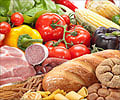Blaming multinational firms for the lack of development of Bolivia’s staple food, President Evo Morales claimed that the western fast food culture is a ‘threat to humanity’

The grain-like quinoa is packed with vitamins and proteins and has been grown in the Andes for 7,000 years. But its cultivation was long banned by European colonizers. Now Morales and many experts are pushing quinoa as a potential answer to global food shortages.
The left-wing Bolivian leader slammed capitalist "fast food" for causing cancer and other diseases, in a speech to the UN General Assembly to launch the commemorative year.
"The fast food of the west is a great harm to humanity," the left-wing leader stormed in a speech in which he said capitalism had been a prime cause of climate change.
"International companies opposed with great force the announcing of the international year of quinoa. They were led by the United States," he said.
"These companies are trying to make sure that the year of quinoa will be a failure" because it will drive up the price and make the product less available.
Advertisement
"They impose their customs and their foods. They seek profit and to merely standardize food, produced on a massive scale, according to the same formula and with ingredients which cause cancers and other diseases."
Advertisement
More than two thirds of the approximately 38,000 tons of quinoa now grown each year in Bolivia is exported -- most of that to the United States and Europe. Peru, which produces more than 40,000 tons, and Ecuador are also major growers.
UN leader Ban said that quinoa is "versatile and delicious" but did not get involved in Morales accusations against food multi-nationals.
"I hope this international year will be a catalyst for learning about the potential of quinoa for food and nutrition security, for reducing poverty -- especially among the world's small farmers -- and for environmentally sustainable agriculture," Ban told the assembly.
Source-AFP















